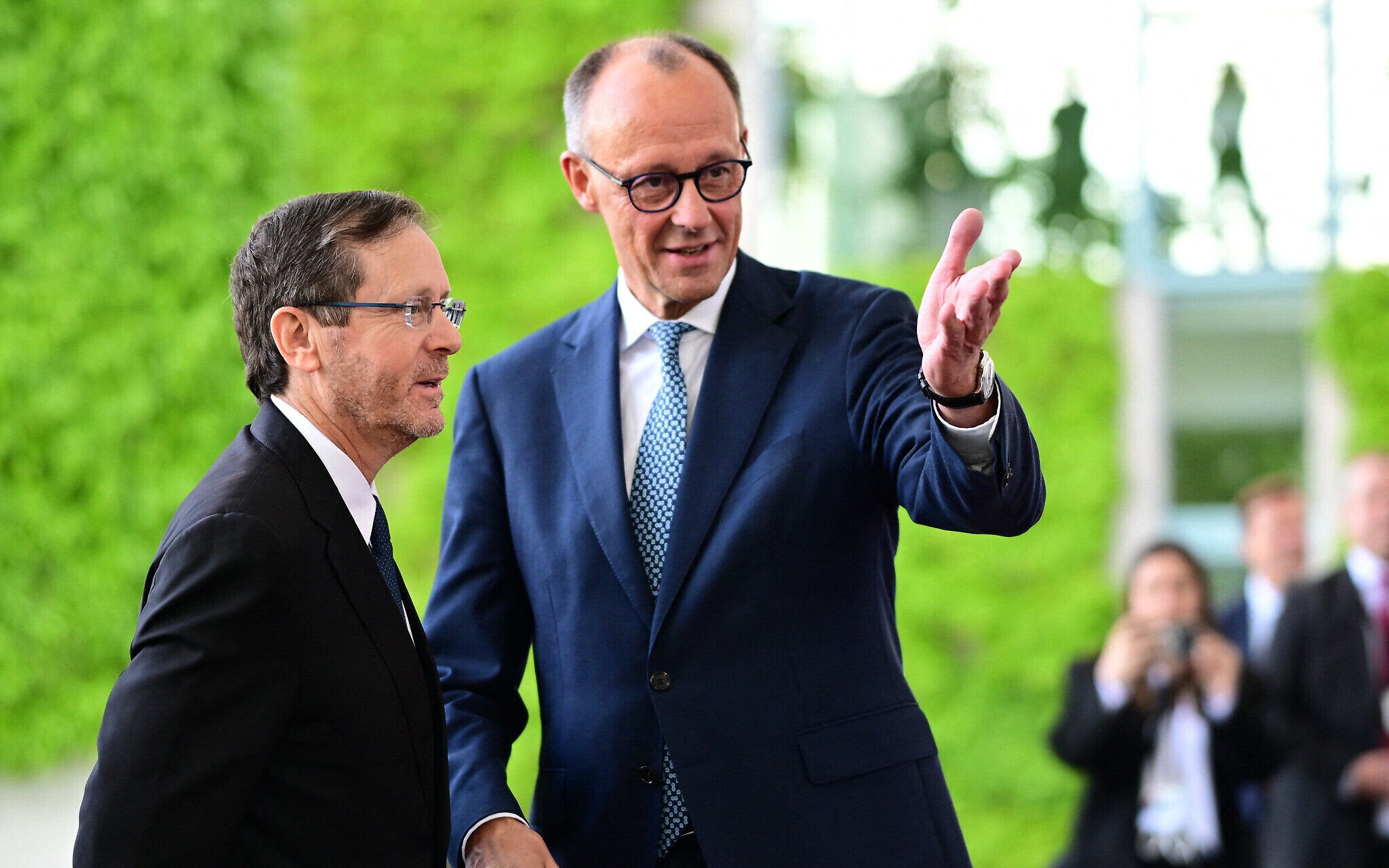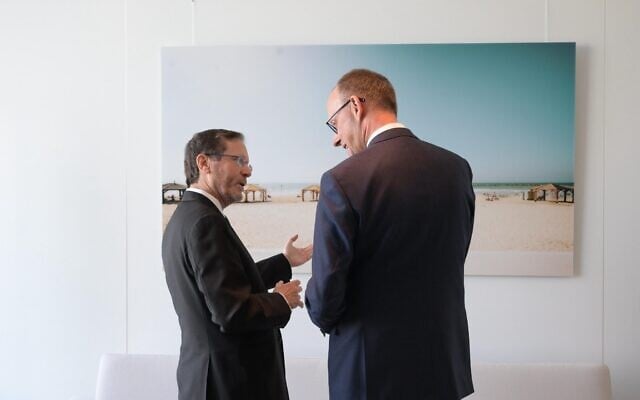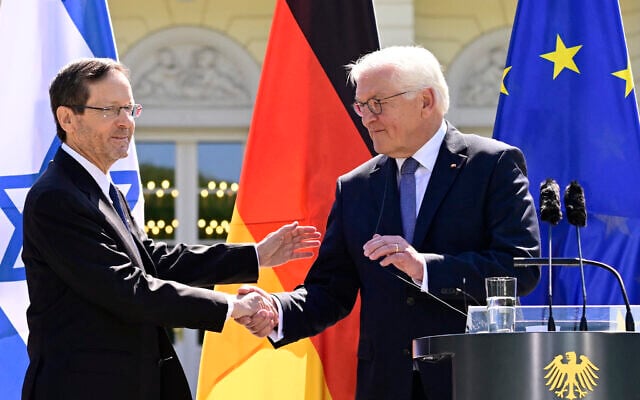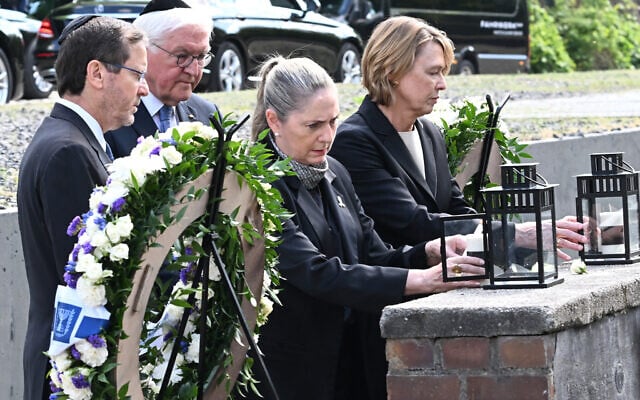



BERLIN, Germany — President Isaac Herzog on Monday became the first foreign leader to be hosted by new German Chancellor Friedrich Merz, just six days after he took the helm of Germany’s government, with Berlin and Jerusalem marking 60 years of strong diplomatic ties, though some cracks have emerged as the war in Gaza drags on.
“The friendship between Germany and Israel is a great treasure that must be preserved 80 years after the Holocaust perpetrated by Germany,” wrote Merz on X after meeting Herzog, adding that he was honored to welcome him “as the first foreign guest of my term in office.”
The two leaders did not make any public comments before or after their meeting, although Herzog’s office said the president stressed during their conversation addressed the hostages remaining in Gaza, including nine with German citizenship.
“We are pleading, demanding and asking the international community to intervene,” Herzog told Merz, according to his office. “Nine of the hostages hold German citizenship. I therefore appeal from here, on behalf of the State of Israel on behalf of my nation, to the international leadership to do everything possible to bring about change.”
During the final moments of their meeting, Herzog and Merz watched together the release of hostage Edan Alexander, who was freed from the Gaza Strip on Monday in a deal between Hamas and the United States after 584 days in captivity. Merz also showed Herzog a photo hanging in his office of the Zikim Beach, where Hamas terrorists murdered 17 civilians on October 7, 2023.
The meeting capped off a whirlwind day for Herzog in Berlin, beginning with an official state welcome ceremony at the Bellevue presidential palace, where he sat down with his longtime friend and close ally of Israel President Frank-Walter Steinmeier. The pair then held a joint press conference during which they lauded their nations’ warm ties, even as some criticism was aired from the country that has emerged as Israel’s strongest defender in Europe.
Standing alongside Herzog, Steinmeier urged Israel to immediately resume humanitarian aid into Gaza, saying the suffering of Palestinians in the Strip needed to end.
Israel must “ensure that humanitarian aid reaches the people of Gaza as quickly as possible… not at some future point, but now,” said Steinmeier. He stressed that Germany understands the dilemma of Hamas embedding in the civilian population and stealing aid that enters the Strip; nevertheless, “the suffering of Gaza’s civilian population” deeply concerns both Germany and Israel’s other friends.
He also noted that the aid agency UNRWA, which Israel has accused of being entangled with Hamas, “is not a worthy partner, so we have to find alternatives” for the distribution of aid.
In his own response, Herzog called on the international community to take part in a new aid mechanism to “enable the distribution of aid directly to the people of Gaza,” referring to a newly unveiled US-backed aid plan to circumvent Hamas.
Steinmeier said the establishment of relations with Israel in 1965 was “a gift that we Germans could not have expected after the horrors of the Second World War,” while Herzog said the countries’ reconciliation and close relations was “a source of hope.”
The German president suggested that Israel needs to seize the opportunities in front of it in order to forge new partnerships with unlikely future allies.
“Germany stands ready to engage with Israel’s neighbors and support dialogue toward a serious political solution,” he said, referring to recent trips to “Cairo, Amman, Qatar and especially Riyadh” as highlighting a “window of opportunity” for Israel, with regard to possible normalization with Saudi Arabia.
“I am concerned that this openness might be lost and that the window of opportunity might soon close,” added Steinmeier. “Therefore, I urge us all to seize the opportunity that still exists, together with other countries, and to work toward a political solution for the sake of the future.”
Herzog, who has long expressed his support for wider peace efforts, declared that “there is nothing I want more than to shake the hands of Sheikh Mohammed bin Salman, the crown prince of Saudi Arabia, as a rapprochement of Jew and Muslim in the region.”
On Monday evening, Herzog was hosted at a state dinner by Steinmeier, and earlier in the day he also met with the president of the Bundestag parliament, spent time with a local youth group, and visited a memorial at the Platform 17 train station from where thousands of Berlin Jews were deported to their deaths during the Holocaust.
Steinmeier is slated to follow Herzog back to Israel on Tuesday, where he will visit the hard-hit Kibbutz Be’eri in the south, meet with Prime Minister Benjamin Netanyahu, and also receive the Israeli Presidential Medal of Honor, as the countries continue to mark the anniversary of their formal establishment of diplomatic relations.
Merz said earlier this year — before he was sworn in as chancellor — that he would invite Netanyahu to visit Germany despite the arrest warrant against the Israeli prime minister issued last year by the International Criminal Court.
Asked on Monday if such a position was wise, Steinmeier said it was a question for the German government, but implied that it was not a good idea for Netanyahu to visit.
“I assume and hope that both sides are clever enough to ensure that a decision never has to be taken on whether to enforce an international arrest warrant against an Israeli prime minister in Germany,” said Steinmeier.
Agencies contributed to this report.



